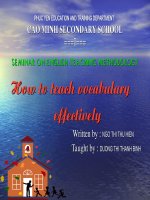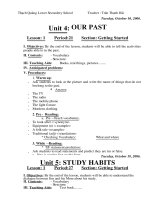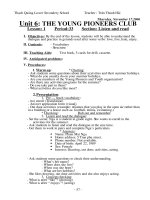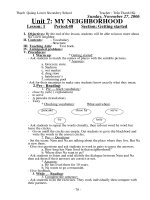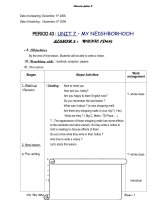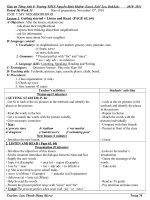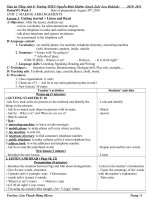Tieng Anh 8 Bài 6
Bạn đang xem bản rút gọn của tài liệu. Xem và tải ngay bản đầy đủ của tài liệu tại đây (89.96 KB, 14 trang )
Th¹ch Qu¶ng Lower Secondery School Teacher : TrÇn Thanh H¶i
Thursday, November 17,2006
Unit 6: THe young pioneers club
Lesson: 1 Period:33 Section: Listen and read
I. Objectives : By the end of the lesson, students will be able to understand the
dialogue and practice in gerunds used after some verbs: love, live, hate, enjoy.
II. Contents: - Vocabulary
- Structure:
III. Teaching Aids: Text book, 5 cards for drill, cassette.
IV. Anticipated problems:
V. Proceduces:
1. Warm up: * Chatting:
- Ask students some questions about their acyivities and their summer holidays.
- What do you usually do on your summer holidays.
- Are you members of the Young Pioneers and Youth organization?
- Are there any activities programs for the summer?
- Do you take part in them?
- What activities do you like most?
2.Presentation:
1. Pre – teach vocabulary :
- (to) enroll (Translation)
- Answer application form (visual)
- Out door activities (example: nGames that you play in the open air rather than
in a building or a house such as: football, tennis, swimming.)
* Checking: Rub out and remember:
2. Listen and read the dialogue :
- Set the scene: Nga is a student in grade eight. She wants to enroll in the activities
for the summer.
- Ask students to listen and read the dialogue at the sme time.
- Get them to work in pairs and complete Nga’s particulars.
* Answers:
• Name: Pham Mai Nga
• Home address: 5 Tran phu street.
• Phone number: Not available.
• Date of birth: April 22, 1989
• Sex: Female
- 57 -
Th¹ch Qu¶ng Lower Secondery School Teacher : TrÇn Thanh H¶i
• Interest: Drawing, out door, activities, acting.
- Ask students some questions to check their understanding.
- What’s her name?
- Where does she live?
- When was she born?
- What are her hobbies?
- She likes drawing, out door activities and she also enjoys acting.
3. Concept checking :
- What is after “like”? (drawing)
- What is after “ enjoys”? (acting)
- What do we call “drawing” and “ acting”? (regund)
- What is the form of “regunds” ? (V – ING)
- When do we use “regund”?(after some verbs: like, love, enjoy, hate, mind)
* Form:
Like, love, enjoy, hate + regund (V ING)–
* Drill: Word cue drill.
- Prepare 5 cards with these cues on them:
a. Play soccer / volleyball
b. Watch TV / listen to music
c. Read books / do homework.
d. Chat with friends / do the housework
e. Cook meal / decorate the house
* Exchange:
What are your hobbies?
I like/ love playing soccer and volleyball.
- T models the first two cues, students repeat in choral twice and then individually
( two or three students).
- The third, fourth and fifth cues: new cue, new student.
- Drill the questions of the exchange first, then drill the answers.
3. Production:
- Ask some pairs of students to practice asking and answering (open pairs)
- Get the whole class to work in pairs ( closed pairs)
* Survey:
- Ask students to copy down the chart.
- Ask students to work in groups of three to ask their friends and stick on the chart.
- Give feedback.
5. Homework:
- Write about their friend’s hobbies.
- 58 -
Th¹ch Qu¶ng Lower Secondery School Teacher : TrÇn Thanh H¶i
Unit 6: The young pioneers club
Lesson: 2 Period:34 Section: Speak
I. Objectives: By the end of the lesson, students will be able to ask for favors and
respond to favors.
II. Contents: - Vocabulary
- Structure:
III. Teaching Aids: Cut out shark, cut out girl/boy, text book.
IV. Anticipated problems:
V. Proceduces:
1. Warm up: * Shack’s attack:
2. Presentation:
- Ask students the meaning of the word FAVOR.
- What do you say to ask for a favor?
Can/ could you help me?
Could you do me a favor?
Can/ could you ?……
- When do you ask for favor? Need some help.
- How do you say to respond to favor?
Certainly / Of course / Sure
No prolem.
- Ask Students to copy down the following phrares:
Asking for favor Responding for favor
- Can/could you help
me please?
- Could you me a
favor?
- I need a favor
- Can/ could you .……
- Certainly/ of course/sure
- No problem.
- What can I do for you?
- How can I help you?
- I’m sorry, I’m really busy.
- Ask students to work in pairs to do exercise. They have to use the expressions
in the box to fill in blanks in the dialogues.
- 59 -
Th¹ch Qu¶ng Lower Secondery School Teacher : TrÇn Thanh H¶i
- Get students to practice speaking in pairs.
a. Could you help me, please?
- Yes, certainly.
- Can you buy a ticket for me.
b. Could you do me a favor?
- What can I do for you?
- Can you take me across the road?
c. I need a favor.
- How can I help?
- Could you help me with this math problem?
d. Can you help me please?
- Yes, of course.
Can you water the flowers in the garden?
3. Production:
- Set the scene then ask students to make a dialogue between Mrs. Ngoc and Hoa.
Mrs. Ngoc is carrying a heavy bag, but she’s hurt her arm so she needs some help.
- Ask students to practice the dialogue in pairs.
- Ask students to make similar dialogues about some of the following situations:
- Ask students to make a similar dialogue and then practice in pairs.
* Answer:
Your neighbor: Could you help me, please?
You: Of course. How can i help you?
Your neighbor: Can you help me to tidy the yard?
I’v broken my leg.
You: Certainly. I’ll help you.
Your neighbor: Thank you very much. That’s very kind of you.
- Ask students to make another dialogue and then practice in pairs.
- Monitor and help students.
4. Homework:
- Give students another sitation and ask them to write a similar dialogue.
+ Your aunt wants you to buy some vegetables because she is busy cooking
dinner.
- 60 -
Th¹ch Qu¶ng Lower Secondery School Teacher : TrÇn Thanh H¶i
Unit 6: The young pioneers club
Lesson: 3 Period:35 Section: Listen - Speak
I. Objectives: By the end of the lesson, students will be able to complete a song and
offer and respond to assistance.
II. Contents: - Vocabulary
- Structure:
III. Teaching Aids: Text book.
IV. Anticipated problems:
V. Proceduces:
1. Warm up: * Listen to a song:
- Let students listen to the song for fun.
2. Pre Listening– .
a. Pre – teach vocabulary .
- To unite ( translations)
- Peace (n) (antonym)
b. Guess the meaning words.
- Ask students to guess the words to fill in the gaps in the song.
- Ask them to share with their partners.
- Give feedback.
3. While Listening– :
- Ask students to listen to the song and fill in the missing words then share
with their partners. * The song: “Childen of our land unite”
Let’s sing for peace
Let’s sing for right
Let’s sing for love between North and South.
Oh children of our land unite.
Children of the world hold hands.
Let’s show our love from place to place.
Let’s shout out loud.
Let’s make a stand.
Oh children of the world, hold hands.
- Give feedback.
4. Presentation:
- Ask students to listen to the dislogue between a receptionist and a tourist:
Receptionist: May I help you?
- 61 -

